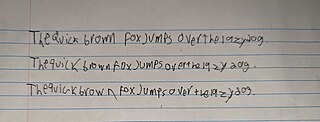Related Research Articles

Dyslexia, previously known as word blindness, is a learning disability that affects either reading or writing. Different people are affected to different degrees. Problems may include difficulties in spelling words, reading quickly, writing words, "sounding out" words in the head, pronouncing words when reading aloud and understanding what one reads. Often these difficulties are first noticed at school. The difficulties are involuntary, and people with this disorder have a normal desire to learn. People with dyslexia have higher rates of attention deficit hyperactivity disorder (ADHD), developmental language disorders, and difficulties with numbers.

Wernicke's aphasia, also known as receptive aphasia, sensory aphasia, fluent aphasia, or posterior aphasia, is a type of aphasia in which individuals have difficulty understanding written and spoken language. Patients with Wernicke's aphasia demonstrate fluent speech, which is characterized by typical speech rate, intact syntactic abilities and effortless speech output. Writing often reflects speech in that it tends to lack content or meaning. In most cases, motor deficits do not occur in individuals with Wernicke's aphasia. Therefore, they may produce a large amount of speech without much meaning. Individuals with Wernicke's aphasia often suffer of anosognosia – they are unaware of their errors in speech and do not realize their speech may lack meaning. They typically remain unaware of even their most profound language deficits.

A psychiatric hospital, also known as a mental health hospital, or a behavioral health hospital, is a specialized medical facility that focuses on the treatment of severe mental disorders. These institutions cater to patients with conditions such as schizophrenia, bipolar disorder, major depressive disorder, and eating disorders, among others.
A communication disorder is any disorder that affects an individual's ability to comprehend, detect, or apply language and speech to engage in dialogue effectively with others. This also encompasses deficiencies in verbal and non-verbal communication styles. The delays and disorders can range from simple sound substitution to the inability to understand or use one's native language. This article covers subjects such as diagnosis, the DSM-IV, the DSM-V, and examples like sensory impairments, aphasia, learning disabilities, and speech disorders.
Agraphia is an acquired neurological disorder causing a loss in the ability to communicate through writing, either due to some form of motor dysfunction or an inability to spell. The loss of writing ability may present with other language or neurological disorders; disorders appearing commonly with agraphia are alexia, aphasia, dysarthria, agnosia, acalculia and apraxia. The study of individuals with agraphia may provide more information about the pathways involved in writing, both language related and motoric. Agraphia cannot be directly treated, but individuals can learn techniques to help regain and rehabilitate some of their previous writing abilities. These techniques differ depending on the type of agraphia.

A thought disorder (TD) is a disturbance in cognition which affects language, thought and communication. Psychiatric and psychological glossaries in 2015 and 2017 identified thought disorders as encompassing poverty of ideas, neologisms, paralogia, word salad, and delusions—all disturbances of thought content and form. Two specific terms have been suggested—content thought disorder (CTD) and formal thought disorder (FTD). CTD has been defined as a thought disturbance characterized by multiple fragmented delusions, and the term thought disorder is often used to refer to an FTD: a disruption of the form of thought. Also known as disorganized thinking, FTD results in disorganized speech and is recognized as a major feature of schizophrenia and other psychoses. Disorganized speech leads to an inference of disorganized thought. Thought disorders include derailment, pressured speech, poverty of speech, tangentiality, verbigeration, and thought blocking. One of the first known cases of thought disorders, or specifically OCD as it is known today, was in 1691. John Moore, who was a bishop, had a speech in front of Queen Mary II, about "religious melancholy."
A word salad is a "confused or unintelligible mixture of seemingly random words and phrases", most often used to describe a symptom of a neurological or mental disorder. The name schizophasia is used in particular to describe the confused language that may be evident in schizophrenia. The words may or may not be grammatically correct, but they are semantically confused to the point that the listener cannot extract any meaning from them. The term is often used in psychiatry as well as in theoretical linguistics to describe a type of grammatical acceptability judgement by native speakers, and in computer programming to describe textual randomization.
Dysarthria is a speech sound disorder resulting from neurological injury of the motor component of the motor–speech system and is characterized by poor articulation of phonemes. In other words, it is a condition in which problems effectively occur with the muscles that help produce speech, often making it very difficult to pronounce words. It is unrelated to problems with understanding language, although a person can have both. Any of the speech subsystems can be affected, leading to impairments in intelligibility, audibility, naturalness, and efficiency of vocal communication. Dysarthria that has progressed to a total loss of speech is referred to as anarthria. The term dysarthria was formed from the Greek components dys- "dysfunctional, impaired" and arthr- "joint, vocal articulation".
The mental status examination (MSE) is an important part of the clinical assessment process in neurological and psychiatric practice. It is a structured way of observing and describing a patient's psychological functioning at a given point in time, under the domains of appearance, attitude, behavior, mood and affect, speech, thought process, thought content, perception, cognition, insight, and judgment. There are some minor variations in the subdivision of the MSE and the sequence and names of MSE domains.

Dysgraphia is a neurological disorder and learning disability that concerns impairments in written expression, which affects the ability to write, primarily handwriting, but also coherence. It is a specific learning disability (SLD) as well as a transcription disability, meaning that it is a writing disorder associated with impaired handwriting, orthographic coding and finger sequencing. It often overlaps with other learning disabilities and neurodevelopmental disorders such as speech impairment, attention deficit hyperactivity disorder (ADHD) or developmental coordination disorder (DCD).
Cognitive disorders (CDs), also known as neurocognitive disorders (NCDs), are a category of mental health disorders that primarily affect cognitive abilities including learning, memory, perception, and problem-solving. Neurocognitive disorders include delirium, mild neurocognitive disorders, and major neurocognitive disorder. They are defined by deficits in cognitive ability that are acquired, typically represent decline, and may have an underlying brain pathology. The DSM-5 defines six key domains of cognitive function: executive function, learning and memory, perceptual-motor function, language, complex attention, and social cognition.
Pseudobulbar affect (PBA), or emotional incontinence, is a type of neurological disorder characterized by uncontrollable episodes of crying or laughing. PBA occurs secondary to a neurologic disorder or brain injury. Patients may find themselves crying uncontrollably at something that is only slightly sad, being unable to stop themselves for several minutes. Episodes may also be mood-incongruent: a patient may laugh uncontrollably when angry or frustrated, for example. Sometimes, the episodes may switch between emotional states, resulting in the patient crying uncontrollably before dissolving into fits of laughter.
Multiple complex developmental disorder (MCDD) is a research category, proposed to involve several neurological and psychological symptoms where at least some symptoms are first noticed during early childhood and persist throughout life. It was originally suggested to be a subtype of pervasive developmental disorders (PDD) with co-morbid schizophrenia or another psychotic disorder; however, there is some controversy that not everyone with MCDD meets criteria for both PDD and psychosis. The term multiplex developmental disorder was coined by Donald J. Cohen in 1986.
Progressive bulbar palsy (PBP) is a medical condition. It belongs to a group of disorders known as motor neuron diseases. PBP is a disease that attacks the nerves supplying the bulbar muscles. These disorders are characterized by the degeneration of motor neurons in the cerebral cortex, spinal cord, brain stem, and pyramidal tracts. This specifically involves the glossopharyngeal nerve (IX), vagus nerve (X), and hypoglossal nerve (XII).
Leukoencephalopathy with neuroaxonal spheroids (LENAS), also known as adult-onset leukoencephalopathy with axonal spheroids and pigmented glia (ALSP), hereditary diffuse leukoencephalopathy with spheroids (HDLS) and pigmentary orthochromatic leukodystrophy (POLD) is an extremely rare kind of leukoencephalopathy and is classified as a neurodegenerative disease. LENAS is a cause of severe and subacute dementia that results from damage to certain areas of the brain. This damage is to a type of brain tissue called white matter and axon damage due to swellings which are termed spheroids.
Deep dyslexia is a form of dyslexia that disrupts reading processes. Deep dyslexia may occur as a result of a head injury, stroke, disease, or operation. This injury results in the occurrence of semantic errors during reading and the impairment of nonword reading.

Psychiatry is the medical specialty devoted to the diagnosis, prevention, and treatment of deleterious mental conditions. These include various matters related to mood, behaviour, cognition, perceptions, and emotions.
The relationship between religion and schizophrenia is of particular interest to psychiatrists because of the similarities between religious experiences and psychotic episodes. Religious experiences often involve reports of auditory and/or visual phenomena, which sounds seemingly similar to those with schizophrenia who also commonly report hallucinations and delusions. These symptoms may resemble the events found within a religious experience. However, the people who report these religious visual and audio hallucinations also claim to have not perceived them with their five senses, rather, they conclude these hallucinations were an entirely internal process. This differs from schizophrenia, where the person is unaware that their own thoughts or inner feelings are not happening outside of them. They report hearing, seeing, smelling, feeling, or tasting something that deludes them to believe it is real. They are unable to distinguish between reality and hallucinations because they experience these hallucinations with their bodily senses that leads them to perceive these events as happening outside of their mind. In general, religion has been found to have "both a protective and a risk increasing effect" for schizophrenia.
The Structured Inventory of Malingered Symptomatology (SIMS) is a 75-item true-false questionnaire intended to measure malingering; that is, intentionally exaggerating or feigning psychiatric symptoms, cognitive impairment, or neurological disorders.
References
- 1 2 "Cop ia". Archives.nd.edu. Retrieved 30 December 2014.
- ↑ "Word Information - search results for: dys". Wordinfo.info. Retrieved 30 December 2014.
- ↑ Journal of altered states of consciousness, Volume 4
- ↑ "Welcome to Dyscopia : What does the word dyscopia mean?". Dyscopia.com. Archived from the original on 17 December 2014. Retrieved 30 December 2014.
- ↑ JOSEPH E. BOGEN, M.D. "THE OTHER SIDE OF THE BRAIN I : DYSGRAPHIA AND DYSCOPIA FOLLOWING CEREBRAL COMMISSUROTOMY". Its.caltech.edu. Archived from the original on 3 March 2016. Retrieved 30 December 2014.
- ↑ "Some Long Term Effects of Cerebral Commissurotomy in Man" (PDF). People.uncw.edu. Retrieved 30 December 2014.
- 1 2 Archived March 7, 2010, at the Wayback Machine
- 1 2 "‘Acopia’ and ‘social admission’ are not diagnoses: why older people deserve better" Journal of the Royal Society of Medicine 2008: 101: 168–174
- ↑ Campbell's Psychiatric Dictionary
- ↑ "Acopia - The AzureBlues". Azureblues.com. Archived from the original on 8 July 2012. Retrieved 30 December 2014.